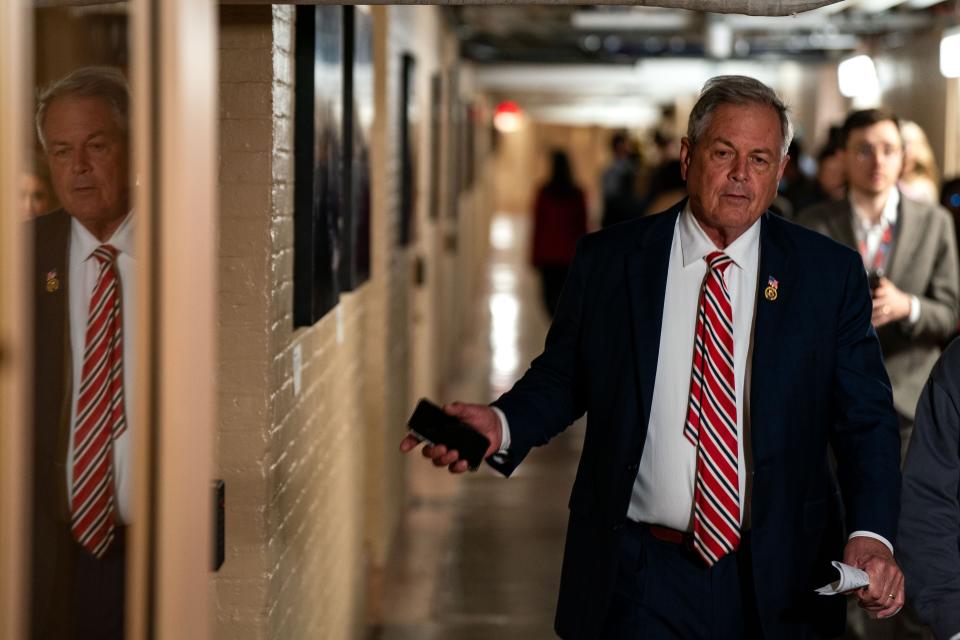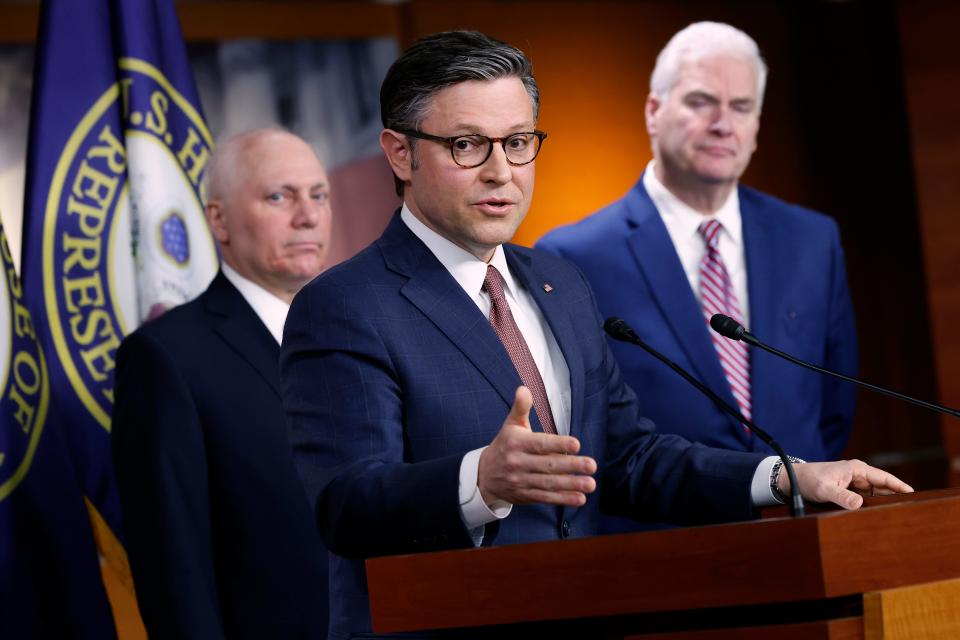House passes $1.2 trillion spending package, crucial step to averting shutdown
- Oops!Something went wrong.Please try again later.
WASHINGTON – The U.S. House passed the final six spending bills needed to avert a government shutdown and finalize funding until September, likely ending a series of shutdown scares that have rocked the country.
The $1.2 trillion package now heads to the Senate, where it was likely to pass late Friday or over the weekend. Government funding runs out at 12:01 a.m. Saturday morning, though a weekend shutdown wasn't likely to be disruptive for most Americans.
More Democrats than Republicans supported the funding bill, which passed 286-134. The minority party has repeatedly carried spending bills and funding extensions in recent months to keep the government's doors open, underscoring not only the fractures among House Republicans but also the political realities of Democrats and Republicans splitting power in Congress.
"Under no circumstances can we tolerate a government shutdown," House Minority Leader Hakeem Jeffries, D-N.Y., said at a news conference Thursday. "We have a responsibility to make sure that the government is funded, and the six appropriations bills do so in a way that takes care of the health, the safety, the education and the economic well-being of the American people."
Conservative backlash in the House
The bill drew intense backlash from ultraconservative lawmakers, who have railed against almost every bipartisan deal in recent months. Those members assailed the deal passed Friday for not clearing the way for deeper spending cuts and GOP priorities on border and migrant policy.
House Speaker Mike Johnson, R-La., those conservatives said, should have threatened a government shutdown to extract conservative wins from Democrats. But Johnson and swaths of other House Republicans have often said shutting down the government is not an option.
"It’s total lack of backbone, total lack of leadership, and a total failure by Republican leadership. There’s no other way to describe it," Rep. Chip Roy, R-Texas, said Thursday on former President Donald Trump adviser Steve Bannon's "War Room" podcast, calling the bill an "abomination."
Rep. Marjorie Taylor Greene, R-Ga., filed a motion to vacate Johnson, to oust him from the speakership, on Friday for working with Democrats to pass the bill. However, the House won't have to vote on it until Greene decides to make it "privileged," at which point the House would have two days to consider it.
"I filed the motion to vacate today, but it's more of a warning and a pink slip," Green said Friday after filing the resolution.
Johnson also faced pushback from conservatives because GOP leaders broke their promise that lawmakers would have 72 hours to review legislation before voting on it. The spending agreement was unveiled early Thursday, and members ended up having a little over 30 hours to read the bill, which was 1,012 pages long.
"Don't vote on something you haven't read − that's the basis of anything." Rep. Ralph Norman, R-S.C., told reporters Wednesday. "Would you buy a toaster without reading the details or the fine print? We haven't had that chance. We've got to have that."
Norman noted afterward that a car would have been a more fitting analogy.

For what it's worth, 72 hours likely wouldn't have changed many hearts and minds. Even before negotiators reached an agreement, more than 40 House conservatives circulated a letter this week urging their fellow Republicans to vote against the final spending product if it did not include their policy demands. Rep. Thomas Massie, R-Ky., argued he needed 72 hours "to help people know what's in the bill."
What's in the bill?
Despite conservative protests, Republican leaders touted several of their own victories from the bipartisan compromise. Among them, Republican negotiators championed an increase in funding for 22,000 border patrol agents and ICE detention bed capacity for migrants at the southern border.
Perhaps' one of their most significant wins was halting funding for UNRWA, a United Nations relief agency that is providing aid to Palestinians in Gaza after Israel's allegations that 12 of the agency's staffers abetted Hamas' Oct. 7 attack. Progressive Democrats who voted against the bill balked at the elimination of funding for the aid organization.

Democrats were also able to brag about their own wins, hailing a new $1 billion investment in child care and Head Start, an early childhood development program for low-income families. Additionally, Democrats secured new funding for Alzheimer's research and cancer research, among other initiatives.
But Democrats also celebrated what was not included in the bill, beating back Republican demands for conservative policy add-ons. Senate Appropriations Committee Chair Patty Murray, D-Wash., said in a statement Thursday that Democrats "defeated outlandish cuts that would have been a gut punch for American families and our economy" and "fought off scores of extreme policies."
This article originally appeared on USA TODAY: House passes $1.2 trillion funding deal that would avert shutdown

